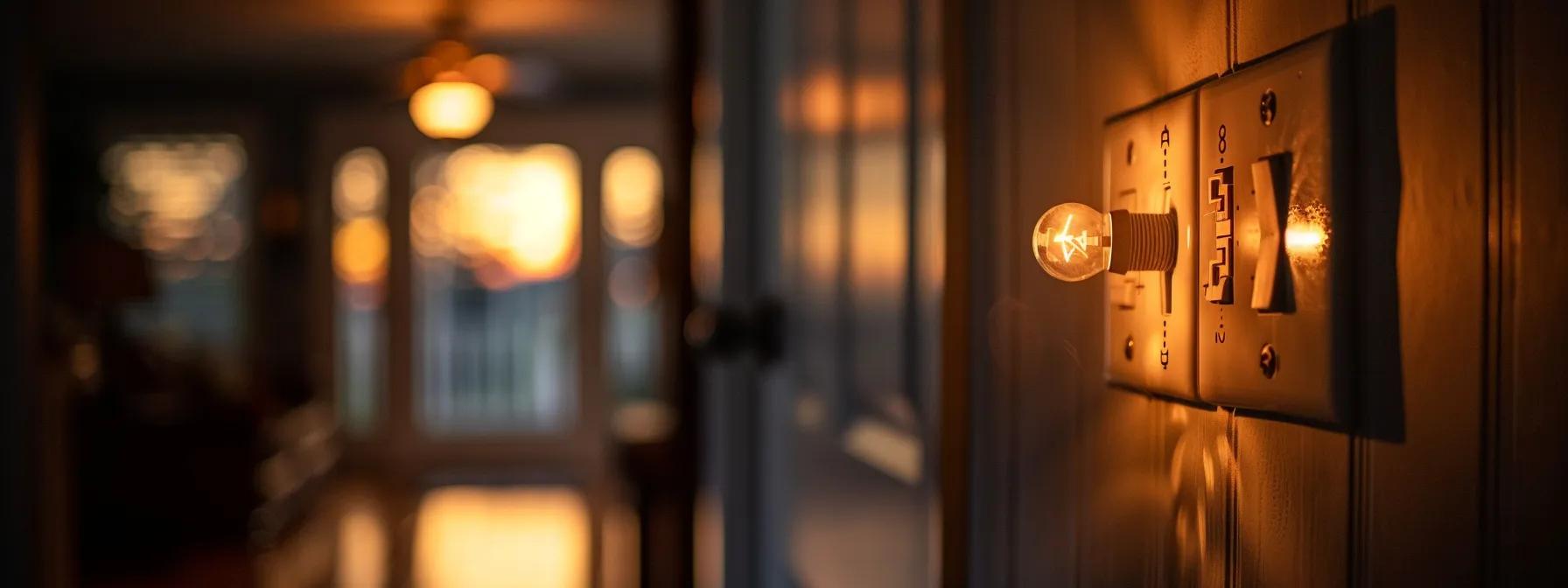Warning Signs of Electrical Issues: What Lexington, KY Homeowners Should Know to Protect Their Homes
Electrical problems in homes can pose serious risks if left undetected. Lexington, KY homeowners must recognize common electrical warnings and take proactive measures to avoid hazards. This article outlines key warning signs of potential electrical issues and offers guidance on preventing electrical fires, scheduling inspections, and knowing when to call a professional for repairs—all essential for protecting property, family safety, and avoiding costly emergency repairs.
What Are the Most Common Electrical Issues Lexington, KY Homeowners Should Watch For?
Understanding common electrical issues is crucial for maintaining a safe home environment. Homeowners should be familiar with early warning signs of developing problems in their electrical systems.
What Causes Flickering Lights and When Should You Be Concerned?
Flickering lights are often the first sign of electrical issues. They usually result from loose connections, overloaded circuits, or aging wiring. Persistent or accompanied flickering may indicate deteriorating wiring or intermittent shorts, requiring prompt evaluation by a licensed electrician. Continued flickering can also damage appliances.
Why Do Circuit Breakers Trip Frequently in Lexington Homes?
Frequent circuit breaker trips can signal issues like overloaded circuits, loose wiring, or faulty breakers. Occasional trips may be normal with high-demand appliances, but regular occurrences suggest underlying problems that increase the risk of overheating and electrical fires. A professional inspection can determine if upgrades or rewiring is needed.
What Does a Burning Smell From Outlets Indicate and What Should You Do?
A burning smell near outlets is a serious warning of overheated wiring or failing components. This odor, produced by melting insulation, may quickly escalate to a fire hazard. Homeowners should unplug devices, stop using the outlet, and call an experienced electrician immediately to avoid possible injuries or expensive repairs.
How to Troubleshoot Outlets That Are Not Working Properly?
When outlets stop working, start by checking the circuit breaker and inspecting for visible damage or loose wires. Sometimes a tripped safety switch, such as a GFCI outlet, is to blame. If resetting the breaker or testing another appliance doesn’t resolve the issue, hiring a professional is advisable. Persistent problems might indicate poor installation or outdated wiring incompatible with modern electrical loads.
What Other Warning Signs Like Buzzing Sounds or Electrical Shocks Should You Know?
Buzzing sounds from electrical panels or outlets, and mild shocks from switches or appliances, indicate possible arcing, overloaded circuits, or compromised grounding. These symptoms are serious warning signs that require immediate professional assessment to prevent further damage and protect inhabitants from potential shocks.
How Can Lexington Homeowners Prevent Electrical Fires and Shock Hazards?

Prevention is key. Regular maintenance, proper installation of safety devices, and proactive behavior are essential to reducing the risk of electrical fires and shock hazards.
What Are the Main Causes of Electrical Fires in Residential Homes?
Electrical fires are mostly caused by faulty wiring, overloaded circuits, and poor installations. Aging wiring may develop short circuits that generate excessive heat, while substandard installation practices can exacerbate these risks. Regular inspections and adherence to the National Electrical Code (NEC) help mitigate these dangers.
How Can You Protect Your Family From Electrical Shock Hazards?
Protect your family by ensuring all outlets are properly grounded and equipping high-risk areas such as kitchens and bathrooms with protective devices like GFCI outlets. Educate household members not to tamper with electrical equipment, test safety devices routinely, and repair damaged wiring promptly to minimize shock risks.
Why Is Childproofing Electrical Outlets Important in Lexington Homes?
Childproofing is critical because curious young children may insert objects into outlets. Using outlet guards and tamper-resistant receptacles creates an effective barrier, while ensuring inaccessible exposed wiring further protects children from possible electrical injuries.
What Is the Role of GFCI Outlets in Preventing Electrical Accidents?
GFCI outlets monitor electrical imbalances and quickly shut off power when discrepancies are detected, reducing shock risks. Installing GFCIs in moisture-prone areas is recommended and provides fast-acting protection that is indispensable for a modern electrical safety system.
Why Are Regular Electrical Inspections Essential for Lexington, KY Homes?
Regular inspections help detect potential issues early and ensure compliance with local safety codes. They provide peace of mind by confirming that the system is secure, well-maintained, and up to date.
What Are the Benefits of Scheduling an Electrical Inspection?
Scheduling inspections can prevent fire hazards, reduce energy waste, and extend the life of your electrical system. They identify issues such as outdated wiring, overloaded circuits, or faulty installations before escalating into major incidents. Homeowners benefit from professional advice that enhances safety, saves costs, and improves electrical efficiency.
What Happens During a Professional Electrical Inspection?
A certified electrician examines wiring, outlets, circuit breakers, and connected systems in accordance with NEC requirements. The inspection includes evaluations of outlet functionality, wire condition, and panel integrity. Any safety hazards are documented with recommended remedies, giving homeowners a clear understanding of their system’s condition.
How Often Should You Have Your Electrical System Inspected in Lexington?
Electrical systems should be inspected every 3 to 5 years, with more frequent checks for older homes. Homes built before modern standards may need annual inspections until upgrades are completed. In Lexington, where weather conditions can affect wiring, timely inspections are crucial.
What Should Be Included in an Electrical Maintenance Checklist?
A maintenance checklist should cover circuit breakers, wiring, outlet testing, and GFCI functionality. It should also include inspections of outdoor lighting, generator cable connections, and the overall integrity of electrical panels. Keeping a record helps track repairs and plan future inspections.
What Lexington, KY-Specific Electrical Codes and Conditions Should Homeowners Know?

Lexington homeowners must understand local electrical codes and environmental factors that affect their systems. This knowledge supports informed maintenance and safety investments.
What Are the Key Electrical Code Requirements in Lexington, KY?
Key requirements include strict adherence to the NEC and any local amendments. These codes cover safe wiring practices, load capacities, and the installation of safety devices like GFCI outlets in high-risk areas. Meeting these standards minimizes risks and is often required for insurance compliance.
How Do Older Homes in Lexington Affect Electrical Safety and What Issues Are Common?
Older homes may have outdated wiring, lack proper grounding, or use materials that do not meet modern standards. Problems such as degrading insulation, knob-and-tube wiring, and insufficient circuit capacities are common. Upgrading these systems is necessary to reduce shock hazards and improve energy efficiency.
What Weather-Related Electrical Problems Are Frequent in Lexington, KY?
Weather conditions like thunderstorms, heavy rain, and extreme temperatures can worsen electrical issues. Moisture intrusion, wind damage, and lightning may overload circuits and harm outdoor wiring. Homeowners should consider weatherproofing and surge protection to address these challenges.
How Can Local Electrical Service Providers Help With These Unique Challenges?
Local electricians are familiar with regional code requirements and weather-related issues. They offer solutions like upgraded surge protectors, routine inspections after storms, and specialized rewiring services for older homes, ensuring repairs meet national standards and local needs.
When Should Lexington Homeowners Call a Professional for Electrical Repairs?
Homeowners should contact professionals for repairs involving wiring, circuit breakers, or unexplained odors, as these issues require expert diagnosis and repair.
What Are the Signs That Require Immediate Electrical Repair?
Immediate repairs are necessary when persistent flickering lights, burning odors near outlets, frequent breaker trips, or buzzing sounds are observed. These indicate serious wiring issues or overloads that can escalate into fire hazards or shocks if not promptly addressed.
How Much Does Electrical Repair Typically Cost in Lexington, KY?
Costs for repairs vary widely. Minor repairs like outlet replacement or breaker resets might cost between $100 and $300, while extensive rewiring or panel upgrades can run from $500 to several thousand dollars. Licensed electricians provide accurate estimates to help prioritize repairs based on urgency and budget.
What Should You Expect From a Licensed Lexington Electrician?
A licensed electrician will inspect the affected area, diagnose the issue, and propose solutions that comply with local safety codes. They offer detailed estimates, repair or upgrade options, and ensure work is safely completed with warranties and clear communication.
How Can Emergency Electrical Services Protect Your Home?
Emergency services are crucial for urgent issues such as exposed wiring, sparking outlets, or complete power outages. These services respond quickly to prevent further damage, reduce fire risks, and restore safety with round-the-clock availability from qualified technicians.
What Are the Best Practices for Electrical Safety and Maintenance in Lexington Homes?

Implementing best practices is vital to prevent hazards and extend the lifespan of electrical systems. Consistent maintenance, proper use of safety devices, and modern upgrades are key.
How Can You Create a Safe Electrical Environment at Home?
A safe environment is built through proper installation and regular testing of circuits, outlets, and devices. Avoid overloading outlets, maintain cords in good condition, install surge protectors, and clean electrical panels regularly while following manufacturer instructions for appliance use.
What Are the Recommended Seasonal Electrical Maintenance Tasks?
Seasonal tasks include inspecting outdoor lighting and wiring before harsh weather, testing GFCI outlets at least twice a year, and scheduling inspections after storms. Additional tasks such as checking HVAC wiring, verifying generator installations, and ensuring emergency lighting works properly are essential. A maintenance log helps track and schedule these tasks.
How Does Smart Home Technology Impact Electrical Safety and Upgrades?
Smart home technology offers advanced monitoring and automated responses that enhance safety. Devices like smart smoke detectors, energy monitors, and automated circuit breakers alert homeowners to issues. These technologies facilitate remote monitoring, help control updates, and provide valuable data on energy consumption, identifying potential problems early.
What Resources Are Available for Lexington Homeowners to Learn More?
Homeowners can access resources through local utility companies, licensed electricians, and municipal building departments. Workshops, online guides, printed manuals, and safety seminars are often available, along with information from organizations like the Electrical Safety Foundation International (ESFI).
What Frequently Asked Questions Do Lexington Homeowners Have About Electrical Issues?
What Are the Early Signs of Faulty Wiring in Lexington Homes?
Faulty wiring may present as unexplained flickering lights, buzzing sounds, or intermittent power loss. Monitoring these symptoms through routine inspections is key to early detection.
How Can You Tell if Your Circuit Breaker Is Malfunctioning?
A breaker that trips frequently or fails to reset properly suggests malfunction. Professional evaluation is recommended if these signs persist.
What Are the Dangers of Ignoring Electrical Problems?
Ignoring issues can lead to increased risks of fires, shocks, and structural damage. Minor problems can evolve into major hazards that compromise home safety over time.
How Much Does an Electrical Inspection Cost in Lexington, KY?
Inspections typically cost between $150 and $300, depending on the size and complexity of the home’s system. Regular inspections help prevent costly repairs in the long run.
How Can You Find the Best Electricians in Lexington, KY?
Seek recommendations, read online reviews, verify licenses and certifications, and compare estimates. Ensure the electrician has expertise with local codes and residential systems.
Final Thoughts
Lexington homeowners must stay vigilant for early warning signs like flickering lights, frequent breaker trips, unusual odors, and buzzing noises. Regular inspections and adherence to local electrical codes reduce risks and prolong system life, while smart home upgrades offer ongoing monitoring and enhanced safety. By following these best practices, electrical systems can remain safe, efficient, and compliant with modern standards.
Frequently Asked Questions
Q: What are the common electrical warning signs in homes? A: Common signs include flickering lights, burning smells from outlets, buzzing sounds from panels, and frequent circuit breaker trips.
Q: How often should a home electrical system be inspected? A: Inspect the system every 3 to 5 years, or more often in older homes or after severe weather events.
Q: Can minor electrical issues lead to serious hazards? A: Yes, issues like loose connections or faulty wiring can escalate into fire hazards or shock risks if not addressed promptly.
Q: Why are GFCI outlets important in a residential setting? A: GFCI outlets quickly cut off power upon detecting electrical imbalances, helping to prevent shocks.
Q: What should be my first step if I suspect an electrical problem? A: Safely disconnect affected appliances and contact a licensed electrician for a comprehensive inspection and repair plan.

